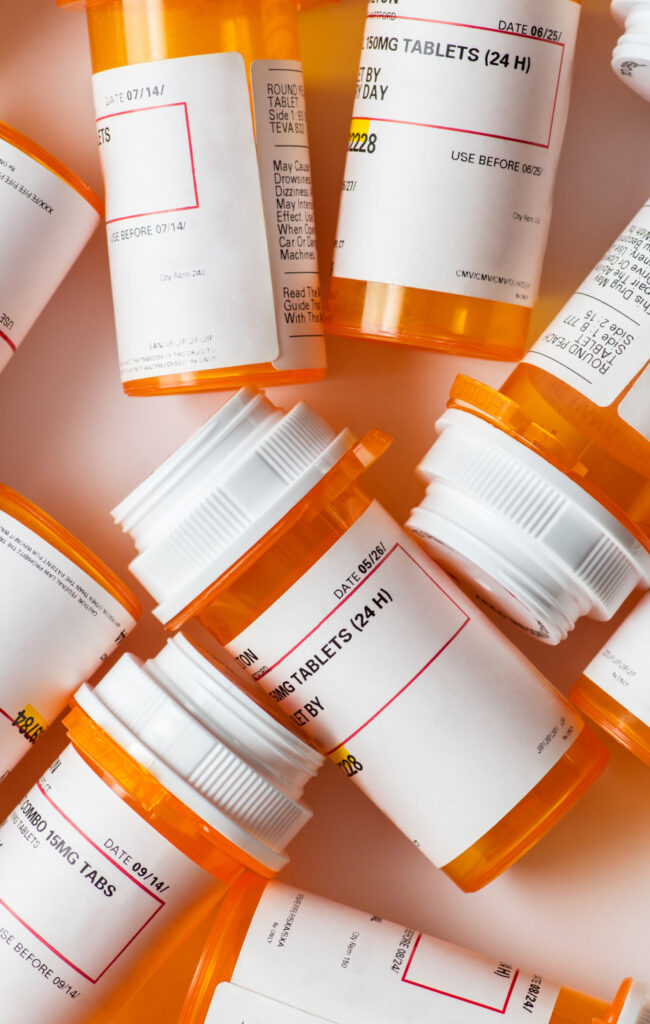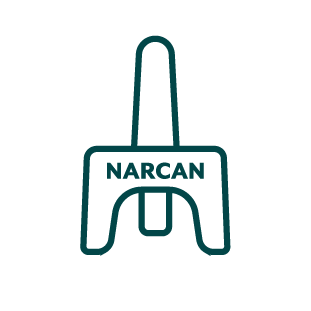Support for Teens &
Young Adults
Support for Teens &
Young Adults
What to look out for if you believe a friend or family member may be misusing opioids?
Some behavioral signs and symptoms of opioid use disorder:
- A change in peer group
- Carelessness with grooming
- Decline in academic or work performance
- Missing classes or work, skipping school
- Loss of interest in favorite activities
- Changes in eating or sleeping habits
- Deteriorating relationships with family and friends
What to look out for if you believe a friend or family member may be misusing opioids?
When taken as directed for a limited time, opioids are not likely to lead to addiction. But most people who misuse opioids get them from friends or relatives and can develop Opioid Use Disorder (OUD).
Some behavioral signs and symptoms of opioid use disorder:
- A change in peer group
- Carelessness with grooming
- Decline in academic or work performance
- Missing classes or work, skipping school
- Loss of interest in favorite activities
- Changes in eating or sleeping habits
- Deteriorating relationships with family and friends
What to look out for if you believe a friend or family member may be misusing opioids?
Some behavioral signs and symptoms of opioid use disorder:
- A change in peer group
- Carelessness with grooming
- Decline in academic or work performance
- Missing classes or work, skipping school
- Loss of interest in favorite activities
- Changes in eating or sleeping habits
- Deteriorating relationships with family and friends
Practicing Harm Reduction
Practicing Harm Reduction
If you or a family member are using opioids:
Only take prescribed pills.
Don’t take pills from a friend, even if they say they’re real. If you think you may need medication, talk to a parent or trusted adult. Get a prescription from a doctor and fill it at a pharmacy.
Don’t mix substances.
Many fake prescription pills and other drugs contain fentanyl, combining them can be dangerous. Using more than one drug at the same time increases the risk of an overdose.
Test strips can show if a drug contains fentanyl. They are fast, easy to use, and not too costly. When the presence of fentanyl is known, people can take steps to reduce the risk of an overdose. Free drug testing kits with instructions for use are available for Lehigh County residents at Change on Hamilton, 927 Hamilton St, in Allentown. They are also available over the counter at many pharmacies.
Don’t use alone.
Look out for each other. If you or a friend are using, stay together to make sure everyone is OK. If something goes wrong, there will be someone to help.

If you or a friend or family member are using opioids:
Only take prescribed pills.
Don’t take pills from a friend, even if they say they’re real. If you think you may need medication, talk to a parent or trusted adult. Get a prescription from a doctor and fill it at a pharmacy.
Don’t mix substances.
Many fake prescription pills and other drugs contain fentanyl, combining them can be dangerous. Using more than one drug at the same time increases the risk of an overdose.
Test strips can show if a drug contains fentanyl. They are fast, easy to use, and not too costly. When the presence of fentanyl is known, people can take steps to reduce the risk of an overdose. Free drug testing kits with instructions for use are available for Lehigh County residents at Change on Hamilton, 927 Hamilton St, in Allentown. They are also available over the counter at many pharmacies.
Don’t use alone.
Look out for each other. If you or a friend are using, stay together to make sure everyone is OK. If something goes wrong, there will be someone to help.

If you have a friend who’s experimenting, recreationally using, or struggling with opioids:
If you have a friend who’s experimenting, recreationally using, or struggling with opioids:

Talk to them.

Talk to them.

Know the signs of an opioid overdose.

Know the signs of an opioid overdose.

Carry or keep Naloxone.
It can reverse an opioid overdose. It’s safe, legal and can save a life.

Carry or keep Naloxone.
It can reverse an opioid overdose. It’s safe, legal and can save a life.

Be prepared to act.

Be prepared to act.
What is a stigma?
People experience feelings of stigma when another person mistreats them or thinks badly about them because of a behavior, characteristic, or trait. Stigma, whether caused by bias, purposeful exclusion, or a lack of understanding about the causes for a personal struggle, is harmful.
What is a stigma?
People experience feelings of stigma when another person mistreats them or thinks badly about them because of a behavior, characteristic, or trait. Stigma, whether caused by bias, purposeful exclusion, or a lack of understanding about the causes for a personal struggle, is harmful.
Recovery Support Services in Lehigh County
Recovery Support Services in Lehigh County

Addiction is a disease that affects the whole family, not a character flaw. People experiencing substance use disorders (SUD) have trouble controlling their drug use even though they know drugs are harmful. Overcoming an SUD is not as simple as resisting the temptation to take drugs. Recovery may involve medication to help with cravings and withdrawal as well as different forms of therapy. It may even require checking into a rehabilitation facility.
If you think you or someone in your family might be losing control of substance use, it’s important to schedule an assessment. Because addiction is chronic and progressive, it doesn’t go away on its own. It gets worse the longer it goes untreated.
Knowing where to start and making sense of the options out there can feel daunting.

If you think you or a friend may be losing control of substance use, it’s important to schedule an assessment. Because addiction is chronic and progressive, it doesn’t go away on its own. It gets worse the longer it goes untreated.
Knowing where to start and making sense of the options out there can feel daunting.
Prevention and Intervention
Valley Youth House – drug and alcohol prevention, education and information services are provided in the elementary, middle, high schools and in the community.
Center for Humanistic Change – provides educational and informational programs to prevent substance abuse.
The Commonwealth of Pennsylvania’s Student Assistance Program (SAP) – designed to assist school personnel in identifying issues including alcohol, tobacco, other drugs, and mental health issues which pose a barrier to a student’s success.
Your school should have a prevention and intervention program, seek it out!

Prevention and Intervention
Valley Youth House – drug and alcohol prevention, education and information services are provided in the elementary, middle, high schools and in the community.
Center for Humanistic Change – provides educational and informational programs to prevent substance abuse.
The Commonwealth of Pennsylvania’s Student Assistance Program (SAP) – designed to assist school personnel in identifying issues including alcohol, tobacco, other drugs, and mental health issues which pose a barrier to a student’s success.
Your school should have a prevention and intervention program, seek it out!

Prevention and Intervention
Valley Youth House – drug and alcohol prevention, education and information services are provided in the elementary, middle, high schools and in the community.
Center for Humanistic Change – provides educational and informational programs to prevent substance abuse.
The Commonwealth of Pennsylvania’s Student Assistance Program (SAP) – designed to assist school personnel in identifying issues including alcohol, tobacco, other drugs, and mental health issues which pose a barrier to a student’s success.
Your school should have a prevention and intervention program, seek it out!


Recovery
Lehigh County’s Recovery Center Change on Hamilton serves our residents by offering people with a substance use disorder a warm, welcoming, judgment free place to find a recovery community, learn skills, and receive assistance through referrals to treatment and other community resources as needed.
Change on Hamilton – located at 927 Hamilton Street, Allentown.

Recovery
Lehigh County’s Recovery Center Change on Hamilton serves our residents by offering people with a substance use disorder a warm, welcoming, judgment free place to find a recovery community, learn skills, and receive assistance through referrals to treatment and other community resources as needed.
Change on Hamilton – located at 927 Hamilton Street, Allentown.
Materials adapted for Rise Above Opioids from:
https://pastop.org/
https://www.lehighcounty.org/departments/human-services/drug-alcohol
https://www.cdc.gov/overdose-prevention/prevention/index.html
https://www.cdc.gov/stop-overdose/stigma-reduction/index.html
https://www.cdc.gov/overdose-prevention/prevention/preventing-opioid-misuse.html
Materials adapted for Rise Above Opioids from:
https://pastop.org/
https://www.lehighcounty.org/departments/human-services/drug-alcohol
https://www.cdc.gov/overdose-prevention/prevention/index.html
https://www.cdc.gov/stop-overdose/stigma-reduction/index.html
https://www.cdc.gov/overdose-prevention/prevention/preventing-opioid-misuse.html




